
Sixty Stories is a collection of sixty short stories written by Donald Barthelme, several of which originally appeared in The New Yorker . The book was first published by G. P. Putnam's Sons in 1981.

Sixty Stories is a collection of sixty short stories written by Donald Barthelme, several of which originally appeared in The New Yorker . The book was first published by G. P. Putnam's Sons in 1981.
Sixty Stories includes works from the writer's first six short-story collections: Come Back, Dr. Caligari (1964), Unspeakable Practices, Unnatural Acts (1968), City Life (1970), Sadness (1972), Amateurs (1976), and Great Days (1979). The full contents are as follows:
The collection was received with great enthusiasm by critics. In The New York Times , critic Anatole Broyard wrote, "Donald Barthelme may have influenced the short story in his time as much as Ernest Hemingway or John O'Hara did in theirs. They loosened the story's grip on the security of plot, but he broke it altogether and forced the form to live dangerously. O'Hara played with the brand names of our things, and Donald Barthelme plays with the brand names of our ideas. While Hemingway and O'Hara worked with specific feelings, he works with the structure of our emotional makeup. A Barthelme collection like 'Sixty Stories' is a Whole Earth Catalogue of life in our time." [1]
In The New York Times Book Review , critic John Romano called Barthelme a "comic genius," adding, "The will to please us, to make us sit up and laugh with surprise, is greater than the will to disconcert. The chief thing to say about Barthelme, beyond praise for his skill, which seems to me supererogatory, is that he is fiercely committed to showing us a good time, at least in the vast proportion of his work. The spirit is: Many things are silly, especially about modern language, and there is much sadness everywhere, but all is roughly well. So let's try and enjoy ourselves, as intelligently as possible...The point is that we are not finished needing, from marvelously gifted writers such as he, help with the vicissitudes of modern life." [2]
Forty Stories , a companion volume to Sixty Stories, was published six years later, in 1987.
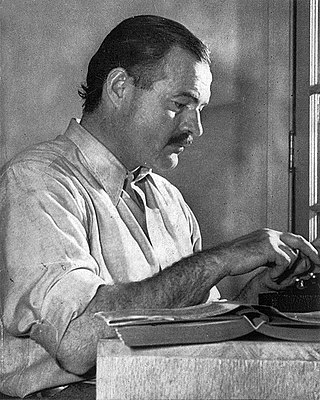
Ernest Miller Hemingway was an American novelist, short-story writer and journalist. Known for an economical, understated style that influenced later 20th-century writers, he has been romanticized for his adventurous lifestyle and outspoken, blunt public image. Some of his seven novels, six short-story collections and two non-fiction works have become classics of American literature, and he was awarded the 1954 Nobel Prize in Literature.

The Human Stain is a novel by Philip Roth, published May 5, 2000. The book is set in Western Massachusetts in the late 1990s. Its narrator is 65-year-old author Nathan Zuckerman, who appears in several earlier Roth novels, including two books that form a loose trilogy with The Human Stain,American Pastoral (1997) and I Married a Communist (1998). Zuckerman acts largely as an observer as the complex story of the protagonist, Coleman Silk, a retired professor of classics, is slowly revealed.

John Henry O'Hara was an American writer. He was one of America's most prolific writers of short stories, credited with helping to invent The New Yorker magazine short story style. He became a best-selling novelist before the age of 30 with Appointment in Samarra and BUtterfield 8. While O'Hara's legacy as a writer is debated, his work was praised by such contemporaries as Ernest Hemingway and F. Scott Fitzgerald, and his champions rank him highly among the major under-appreciated American writers of the 20th century. Few college students educated after O'Hara's death in 1970 have discovered him, chiefly because he refused to allow his work to be reprinted in anthologies used to teach literature at the college level.
Matthew Joseph Bruccoli was an American professor of English at the University of South Carolina. He was an expert on F. Scott Fitzgerald; his biography of Fitzgerald, published in 1981, was considered the standard biography for decades. He also wrote about other writers, including Ernest Hemingway, Thomas Wolfe, and John O'Hara, and was editor of the Dictionary of Literary Biography.

Donald Barthelme Jr. was an American short story writer and novelist known for his playful, postmodernist style of short fiction. Barthelme also worked as a newspaper reporter for the Houston Post, was managing editor of Location magazine, director of the Contemporary Arts Museum in Houston (1961–1962), co-founder of Fiction, and a professor at various universities. He also was one of the original founders of the University of Houston Creative Writing Program.
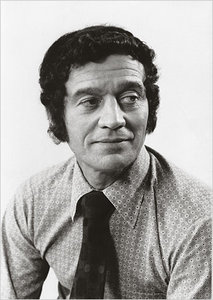
Anatole Paul Broyard was an American writer, literary critic, and editor who wrote for The New York Times. In addition to his many reviews and columns, he published short stories, essays, and two books during his lifetime. His autobiographical works, Intoxicated by My Illness (1992) and Kafka Was the Rage: A Greenwich Village Memoir (1993), were published after his death.
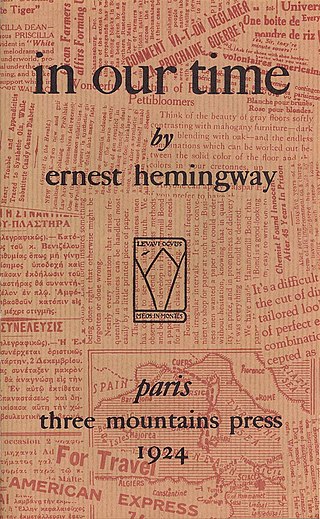
In Our Time is the title of Ernest Hemingway's first collection of short stories, published in 1925 by Boni & Liveright, New York, and of a collection of vignettes published in 1924 in France titled in our time. Its title is derived from the English Book of Common Prayer, "Give peace in our time, O Lord".

Across the River and Into the Trees is a novel by American writer Ernest Hemingway, published by Charles Scribner's Sons in 1950, after first being serialized in Cosmopolitan magazine earlier that year. The title is derived from the last words of Confederate States Army General Thomas J. "Stonewall" Jackson, who was mortally wounded by friendly fire during the American Civil War: “Let us cross over the river and rest under the shade of the trees.” In the 19th century, this was understood to refer to the Jordan River and the passage to death and afterlife in Christianity.

Suttree is a semi-autobiographical novel by Cormac McCarthy, published in 1979. Set in Knoxville, Tennessee, over a four-year period starting in 1950, the novel follows Cornelius Suttree, who has repudiated his former life of privilege to become a fisherman on the Tennessee River.
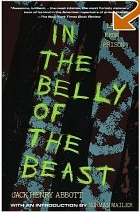
In the Belly of the Beast is a book written by Jack Henry Abbott and published in 1981.

Forty Stories collects forty of American writer and professor Donald Barthelme's short stories, several of which originally appeared in The New Yorker. The book was first published by G. P. Putnam's Sons in 1987.

Robert Olen Butler is an American fiction writer. His short-story collection A Good Scent from a Strange Mountain was awarded the Pulitzer Prize for fiction in 1993.

Men Without Women (1927) is the second collection of short stories written by American author Ernest Hemingway. The volume consists of 14 stories, 10 of which had been previously published in magazines. It was published in October 1927, with a first print-run of approximately 7,600 copies at $2.
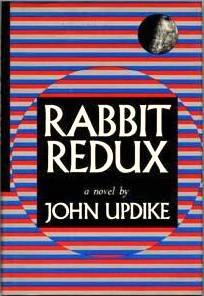
Rabbit Redux is a 1971 novel by John Updike. It is the second book in his "Rabbit" series, beginning with Rabbit, Run and followed by Rabbit Is Rich, Rabbit At Rest, published from 1960 to 1990, and the related 2001 novella, Rabbit Remembered.

Inside Mr Enderby is the first volume of the Enderby series, a quartet of comic novels by the British author Anthony Burgess.

Richard Grenier was a neoconservative cultural columnist for The Washington Times and a film critic for Commentary and The New York Times. The Forbes Media Guide Five Hundred, 1994 stated:
Grenier's maniac, often barbed style is an acquired taste, not recommended to those who prefer polite commentary. He scores against both the administration and Hollywood, two of his preferred topics. ... He takes no prisoners.

Chandler Brossard was an American novelist, writer, editor, and teacher. He wrote or edited a total of 17 books. With a challenging style and outsider characters, Brossard had limited critical success in the United States. His novels were more appreciated in France and Great Britain.
Hilma Wolitzer is an American novelist.

Pictures of Fidelman: An Exhibition is the fifth published novel of Bernard Malamud. It is a novel in the form of a short story cycle, which gathers six stories dealing with Arthur Fidelman, an art student from the Bronx who travels to Italy, initially to research Giotto, but also with the hopes of becoming a painter. It was published in 1969 and includes stories from Malamud's earlier collections The Magic Barrel (1958) and Idiots First (1963), plus two previously uncollected stories and one previously unpublished story.

The Realms of Gold is a 1975 novel by British novelist Margaret Drabble. The novel explores the mid-life experiences of anthropologist Frances Wingate and her affair with Karel Schmidt.